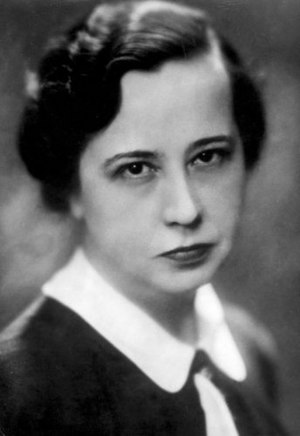Ema Fišerová
This article is incomplete because it is pending further input from participants, or it is a work-in-progress by one author. Please comment on this article's talk page to share your input, comments and questions. Note: To contribute to this article, you may need to seek help from the author(s) of this page. |
Ema Fišerová | |
|---|---|
 Fišerová in 1927 | |
| Member of the National Council | |
| In office 30th December 1925 – 18 October 1931 | |
| Klokov City Council | |
| In office 1936–1948 | |
| Personal details | |
| Born | Ema Sophie Edita Fišerová 3 September 1893 Klokov, Suidenland |
| Died | 18 October 1976 (aged 79) Břevínov, Suidenland |
| Political party | |
Ema "Emi" Sophie Edita Fišerová (3 September 1893 - 18 October 1976) was a Suiden lawyer, feminist and politician, who sat as a member of the National Council for the Free-thinking Democratic League (SDL) between 1925 up until the beginning of the Second World War in 1931, and then later as a member of the Labour Party (DSS) on the Klokov City Council.
Early life and activism
Ema "Emi" Sophie Edita Fišerová was born on 3 September 1893 in the imperial district of Klokov, Suidenland. Her mother, Pavlíná Stýskalová, came from a well-to-do family, as did her father who was a high-ranking civil servant named Henry Fišerová. She attended primary school in the same district as her birth, at Bizia Academy. She later attended Považske Secondary. In 1910 her family moved to a small village outside the city of Břevínov in order to get away from the city life. Two years later she earned an English diploma and began working as a teacher in languages at a local secondary school, a job she held until 1920. She also became a certified English translator.
In 1917, Fišerová began to read law at Břevínov University, one of the top in country, graduating in 1924. During her time at the university, she met Olívie Benešová, leader of the universities Women's Student Association. Ema was later asked to represent the Association in the Suiden Women's Council. During her years in education, the women's movement in Suidenland was waning. The first wave of feminism in Suidenland focused on the right of women to vote and stand for parliament. After these laws came into place in 1920, many feminists continued to fight for equality in other aspects of life.
In 1924, she became an independent lawyer.